
2014 was a great year for books. Unfortunately, there were so many books that we're sure that you didn't get around to reading everything. Neither did we, but still, the I'm With Geek team diligently selected from what literary delights we had devoured which were our favourite reads of the year. So whether you're looking for recommendations or just wanting to see if your favourite made the cut, come inside and check out our Best Books of 2014.
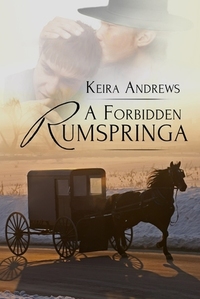
Chosen by Hayley Charlesworth
Keira Andrews is a prolific author on the m/m romance scene, with three releases in 2014 alone (including this book, Semper Fi and Holding the Edge), it is A Forbidden Rumspringa that is one of this year's triumphs. While to a cynical mind, the premise of a gay romance set in an Amish community may seem like it is being controversial for the sake of publicity, that assumption could not be further from the truth. As we detailed in our full review of the novel, Andrews' novel is a touching and honest tale of love, religion, tradition and freedom.
In telling Isaac and David's story, Andrews demonstrates in depth the experiences of young Amish men in the 21st century, with the battle between faith and the developing technological society present regardless of the sexuality of the protagonists. Andrews does not glorify or demonise Amish faith, but merely presents it as honestly as possible in the development of her protagonists. The love story is equally well-written, and crucially unique. Desire and shame are shown in equal measure, and while the story beats are along the same lines of any coming-of-age/coming-out tale, through a thoroughly-researched Amish setting, Andrews makes such a common story feel refreshing, different, and ultimately exceptional.
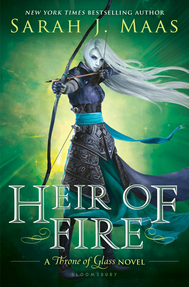
Chosen by Gemma Williams
Heir of Fire is the third instalment of Sarah J Maas' Throne of Glass series. It follows a female, teenage assassin and is set in a fantasy world. Not much more can be said without giving away the entire plot. The amount of detail Maas goes in to draws the reader in. Each book is better than the last, as the story delves deeper and starts making more sense. New characters are introduced and they are all three dimensional characters; even the lead character, Celaena, has parts of her personality that you will dislike. The narration is split between Celaena, the Prince of the country who has a strained relationship with his father, and the Captain of the Guards, giving the reader information about what is happening in the different parts of the world.
This is by far the best of the series so far, and one of my favourite 2014 releases. More magic is incorporated in to the story but it is well balanced and does not take over the narration; it is a tool that must be wielded if Celaena is to survive. The new characters have added extra depth and it ended on a cliffhanger that had me looking for any extra pages I may have missed for more closure.
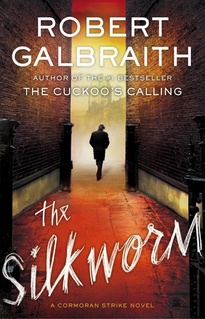
Chosen by Laura W
Is there anything J. K. Rowling can’t do? Between her charitable doings, her frequent Potter writings and updates, and more, she still finds time to continue to write her new series about P.I. Cormoran Strike. J. K. took the world by surprise, even her most loyal fans, when it was revealed she’d written and released a mystery novel, entitled The Cuckoo’s Calling. What was even more surprising was that it was done under the pseudonym of Robert Galbraith. Unfortunately, a so-called friend blew J.K.’s cover and revealed who had actually written the book. Fortunately, the book became a massive success and was absolutely brilliant.
The Silkworm, the follow up to The Cuckoo’s Calling, proved to be just as successful and brilliant as its predecessor. In the year following the Lula Landry case, the cases have been streaming in for Cormoran. When a notorious writer goes missing without a trace, his wife comes to Strike for help. While investigating, Strike finds that his disappearance seems to coincide with the leak of his latest manuscript, Bombyx Mori (Latin for The Silkworm). As time goes on, Strike uncovers several suspects, along with the discovery of the missing author’s body. The suspects begin to turn against each other and the story really begins to unfold. While the work evolves, Cormoran must deal with his personal life as well, including the marriage of his former fiancée.
The Silkworm is absolutely captivating. One cannot truly predict where the story is going. The characters are individuals, each with their own detailed, and thorough, story and background. It’s completely different from what we’re used to from J. K. Rowling. It involves sex, graphic details, a damn good mystery and more. It’s definitely one of the best novels to be released this year.
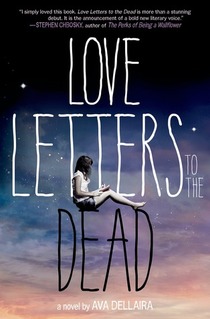
Chosen by Hayley Charlesworth
The unique brilliance of Ava Dellaria's debut is in the way her story is crafted. Ultimately the tale of a young girl's story of grief, acceptance and self-discovery following the death of her older sister, Dellaria chooses the device of letting her tale unfold in letters that the protagonist, Laurel, writes to famous figures who all died young, such as Kurt Cobain, River Phoenix and Amelia Earhart. This makes the story somehow more personal than a straight narrative, as the letters reveal an honesty and an unguarded exploration of emotion and loss than could be felt in another medium. Also clever is the way in which Dellaria links events in Laurel's life with the subjects of her letters, like her sister May's crush on Phoenix, her friend's love of Janis Joplin, even down to dressing as Earhart for Halloween. But it is Kurt Cobain who gets the most focus. Not only is Cobain cast as May's favourite singer, but the music of Nirvana is perhaps the most perfect encapsulation of the feeling of this novel: rebellious teenage angst on the surface, but with something deeper, darker and more vulnerable underneath.
Love Letters to the Dead is not a happy book, but it is a relatable one, touching on so many universal experiences, such as teen rebellion, grief, and growing up, while also exploring some horrors that no person should have to face. But what connects you the most is those dead people. Everybody has that one celebrity, the one that burned bright but quickly, and whose short life and too-soon death remains in your memory. For me, that person is River Phoenix, but this book is full of them, along with the memory of those bright stars who perhaps only touched a couple of lives, reminding us, as the book says, "we exist. Our lives matter."
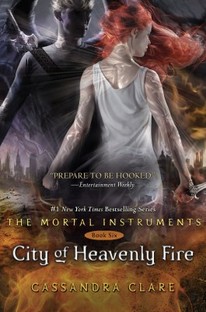
Chosen by Ellie Bowker
Picture the scene. 27th May 2014. I was eagerly waiting for the postman to arrive with my shiny, brand new copy of the final book in The Mortal Instruments series. When the package arrived it was literally as if Christmas had come early, I had been looking forward to read this for ages.
City of Heavenly Fire is Cassandra Clare’s highly anticipated conclusion to the thrilling six part series. The book picks up right where the last finishes as we follow Jace and Clary as they continue to hunt down and end Sebastian for good. Not reading City of Heavenly Fire is like reading all of the Harry Potter books but not Deathly Hallows. It shouldn’t happen, it can’t happen, I won’t let it happen. All of the questions in my mind, the loose ends, the characters, these things have to be tied up and I think the book does that very well. There is no shortage of action but there are still some really emotional parts. I’m not going to lie, I cried. Journeying through the demon realm is the best part which is good because that’s where the majority of the book takes place and the final battle is just mind blowing. Clare leaves our beloved Shadowhunters in a good place as the story comes to an end but it’s still left open to speculation of how the characters continued their lives together. For those who have read The Infernal Devices, there are some obvious links between the two series that will leave you feeling very smug. If you have read the others in the series then reading CoHF is a must. If you haven’t read the series then read the other books then read this one. It is amazing.
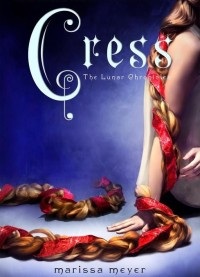
Chosen by Gemma Williams
This is a book I have literally just finished reading. I gradually read the series throughout the year, with many books in between. I enjoyed the first two, they were enough to keep my attention but Cress was in a league of it's own! With only one more book left in The Lunar Chronicles series, this was an extremely powerful penultimate book. It's non-stop excitement.
The Lunar Chronicles are a fairy tale retelling using the characters of Cinderella, Little Red Riding Hood, Rapunzel and Snow White, in a sci-fi setting. It shouldn't work, but it does. The characters get to explore space as they prepare for their final battle with Queen Levana, the Queen of Lunar (the moon).
New and old characters reunite in Cress, and we say hi to some characters and sadly, goodbye to others. The whole book was unpredictable and full of twists of turns to shock the reader and shock you it will! This was the best book yet of the series and the year, and Autumn 2015 needs to hurry so that Winter can be in my hands. Fortunately, there is another book being released next year, as book 0.5 in the series, so a prequel to book one, Cinder, called Fairest. This will tell the tale of Queen Levana before the events of Cinder take place. It will have to do until Autumn.
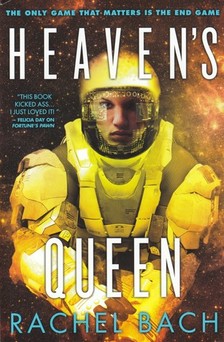
Chosen by Catherine Wignall
My Best Book of 2014 is the third in Rachel Bach’s Paradox Trilogy, Heaven’s Queen. The Paradox Trilogy follows the adventures of Devi, a career mercenary, and her interactions with the crew of the Glorious Fool, a ship that ostensibly operates as a trade ship while travelling through space. When she becomes suspicious of Caldswell, the Fool’s Captain, she discovers that their world is under attack from Phantoms, creatures from another plane of existence, and the only thing preventing these creatures from destroying everything is a shady pseudo-military organisation called the Eyes. Soon Devi is on a mission to uncover the truth about the Phantoms and find whether the Eyes are really the good guys they claim to be.
It’s great to find a feminist space opera series. Devi is clearly at the top of her game and takes pride in her battle tech. She’s self-reliant, smart, tenacious, and flawed. She is clearly independent and rebuffs archaic versions of romantic love, refusing to put up with jealousy or possessiveness. So often in novels of this sort the female lead is great, but her male romantic love interest is better. Here it’s refreshing to find that while Rupert, Devi’s love interest, is a genetically modified super soldier, this is more of a hindrance to him than anything else. He defers to Devi and trusts her judgement throughout, and ultimately supports her above all else.
However, the real strength of the series is in how morally complex it becomes. It would have been easy to make this a simple of case of black and white good and bad guys, but Rachel Bach really explores moral quandaries related to Utilitarianism and, in doing so, forces the reader into an uncomfortable place at times. In order to save the majority, how much is a civilisation willing to sacrifice, and who are the people they are willing to sacrifice?
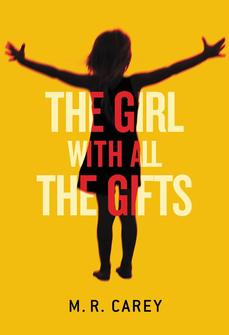
Chosen by Helen Langdon
Today, in any type of media you choose to mention, post-apocalyptic stories are flooding the market. It’s got to be something special to stand out from the crowd. Luckily, The Girl With All The Gifts really is great, taking a standard zombie story and twisting it into a new narrative. At its heart, it’s the story of a special young girl, Melanie, and her relationship with the adults that surround her, all of whom want something from her, whether it’s redemption or to use her for scientific experimentation.
The novel is a mixture of thriller, coming-of-age story and Greek mythological journey, with the strange relationship between Melanie and her teacher Miss Justineau the core that holds the story together. At one point Melanie has an almost romantic crush, while still viewing Miss Justineau as the mother she’s never had, while the teacher in turn sees in Melanie the chance to make up for her mistakes. The alternating character points of view in successive chapters is its strength, both because it reveals the world gradually, and because none of the adult characters are really that nice, or even particularly likeable. They’re all selfish, only dealing with each other because they need to survive. Set in a dystopic version of the UK, both setting and characters feel disturbingly real, and lends the whole novel a terrifying and compulsive air.
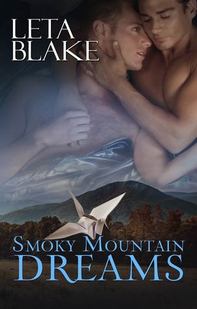
Chosen by Hayley Charlesworth
Smoky Mountain Dreams came right at the end of 2014, following up Leta Blake's early-year release The River Leith, and this Christmas-set romance was the perfect book to end the year on. Set around a Dollywood-esque Tennessee theme park that gives the novel its name, Smoky Mountain Dreams is a touching, sometimes upsetting romance that covers such diverse themes as failed stardom, religion, family, homosexuality, and even a debate on the right to die. What results is a complex drama, full of angst and romance, but also at times heartwarming and quite funny.
More than anything, Smoky Mountain Dreams reveals Blake as a talented author, capable of twisting between devastating tragedy, erotic romance scenes and introspective examinations of identity without missing a beat. With so many things up in the air, it is the seamless flow of the narrative that is most impressive, coupled with a flawless use of description to create a realistic and yet beautiful atmosphere in every scene. The only disappointment of Smoky Mountain Dreams is simply that it ended.
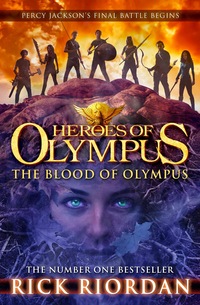
Chosen by Gemma Williams
I have been a big fan of Riordan's books for ten years at least. I've read them all, minus one novel and a few companion pieces, and this year marked the release of the final book in the Heroes of Olympus series. There are five books and it follows on as a continuation of sorts from the Percy Jackson series.
Heroes of Olympus as a whole has been entertaining for me but still cannot beat the epicness that is Percy Jackson. The books ranged from being fantastic to just okay. Blood of Olympus had many problems with it, but it also did many things right. One of the major issues was the lack of chapters from Percy or Annabeth's perspectives. However, the story was engaging and exciting, introducing us to yet more Greek and Roman Gods and heroes from the past and tied up all the loose ends nicely so there was a strong sense of closure, though not enough that it means his new series won't be a huge hit!
However, the final battle that has been hyped up across four and a half books was hugely anti-climactic and felt rushed, but on the whole, the book was satisfying and I enjoyed it. It still doesn't compare to his first series though!
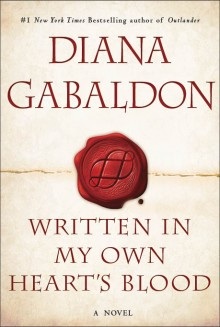
Chosen by Heather Stromski
In the eighth installment in the wildly popular Outlander series by Diana Gabaldon, we are returned once again to the world of Claire Elizabeth Beauchamp Randall Fraser, erstwhile time-traveler who meets the love of her life two hundred years in her own past. While several of the Outlander books suffer from a bit of a slow start, Written in My Own Heart's Blood gallops out of the gate. At the same time that we witness the return of a presumed-dead Jamie Fraser to discover all manner of drama that has gone on in his absence, we are left at the edge of our seat with the disappearance of young Jemmy, resulting in the separation of Roger and Brianna as Roger once again steps back in the past to follow the clues to find his son, while Brianna stays to hold the fort, not knowing that there is danger waiting in her own house.
Gabaldon immerses us in the world of the American Revolution, privy to both the meetings of high-ranking men such as Generals Washington and Howe, as well as the trials of those who never make the history books. This series has truly been what can be considered an epic, spanning decades and history with both delicacy and excitement, bringing it to life in a way that few but Gabaldon can manage, and this instalment of the series is perhaps the cream of the crop, behind only the first novel as my favorite. It puts family and safety up against dreams and freedom, showing the war between the two even as they are themselves married together, mirroring the war that serves as its backdrop. The end, of course, leaves faithful readers hanging, desperate for the next chapter in the ever-growing story of Claire and her family.
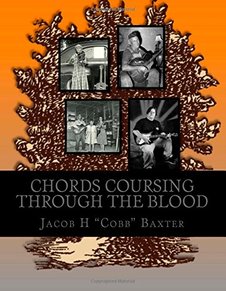
Chosen by "Cobbicus Prime"
What's the best book that I read this year? It's Chords Coursing Through The Blood by... well, by me! I know that sounds a little self absorbent. But, I am answering the question in the most literal sense of the word. I poured my heart and soul into it and am very pleased with the final product. It is the story of how music has been in my family for over 130 years now. At least one person in every generation has carried the torch onward. We have all plied the trade with pride and honour. Although one of the least talented standing among some highly skilled players, I carry on the tradition as well. It documents my struggles to find my place and make peace with the fact that even though I'm not as good as the rest, the fact that I am indeed standing with them is good enough for me. Detailed stories of times past are windows into our family history. And, the amusing anecdotes of my own life story are sure to entertain.
Included are tales involving my grandparents' band, m attempting to form several bands, almost getting kicked out of piano class, chasing a drummer through the hallways of a college, playing The Monkees with an accordion, and how I came about playing a guitar for a rap music track. It is available on Amazon.
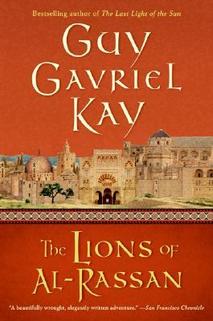
A couple of our writers didn't read a new release in 2014, but still wanted to contribute the best book they read this year. Their choices are below.
The Lions of Al-Rassan by Guy Gavriel Kay
Chosen by Emlyn Roberts-Harry
Classifying this book is difficult. It's a hybrid of fantasy and historical fiction: inspired by medieval Spain, the setting, its geography and the broad strokes of the story are based on historical events; but the names and details are changed and the characters are largely fictional, as is much of the plot.
The Lions of Al-Rassan is a spectacular example of what can be done with fantasy when the author is willing to do something completely different from everyone else – which is pretty much the point of writing fantasy. The setting gives Guy Gavriel Kay the opportunity to exploit all the richness of history for his story, while never being constrained by the facts, which means you get the best of both worlds: an exquisitely constructed setting where the world-building never overshadows the actual plot.
It's almost unbearably moving at times, and it brought me to tears on more than one occasion. More than that, though, it’s a fascinating look at a period of history which is relatively untaught in the West. What we generally think of as the Dark Ages was in fact the golden age of Islamic civilisation: Cordoba was the most populous city in the world at the time, and one of the leading centres of education.
It’s difficult to come away from reading Lions still thinking that organised religion is a good thing, though, since it attacks the concept with surgical precision: it’s invariably the religious leaders who provoke war in the name of their god, where the secular ones are far more inclined to peace. And refreshingly, the only heroism to be found in war is in the act of saving lives, not ending them: the protagonists are soldiers, to be sure, but the true heroes are doctors – and advancements in medicine were among the greatest achievements of Islamic Spain.
Arguably Kay’s best book, The Lions of Al-Rassan is epic entertainment in the grandest tradition of fantasy fiction, as well as a thoughtful treatise on major issues we’re still dealing with today. And if it inspires you to learn more about medieval Spain, so much the better.
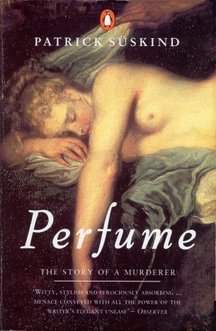
Chosen by Charlotte Dibley
So, another year has been and gone. In the space of 365 days I’ve managed to get through a variety of books, some uplifting and energising, others dark and demoralising. When asked the question ‘what’s been your best read of 2014?’ I initially panicked and mentally scrolled through all of the books that I’ve got through this year. Then, the answer came to me with relative ease.
Perfume: The Story of a Murderer by Patrick Süskind is my winner! Although published in 1985, I only got round to it in July. Telling the story of Jean Baptiste Grenouille in eighteenth century France, Perfume details Grenouille’s life as an outsider with an extraordinary sense of smell. Becoming a perfumer’s apprentice, Grenouille’s passion for scent and hatred for humans collides as he seeks to make the ultimate fragrance.
This book is not a breeze to read. The main character is despicably vile yet wholly captivating and the story is largely nonsensical. It’s a dark fairy tale, all at once surreal and inventive, vivid and consuming. I was trapped in a Grenouille bubble (admittedly not always a pleasant place to be) but I wouldn’t have had it any other way. The setting, the characters and the tale itself just feel so completely alive. When I finished it, I was exhilarated, horrified, stunned and strangely excited because I wanted to go back and read the whole thing again. That doesn’t happen very often.
It’s a book that I’ll repeatedly come back to and this makes Perfume a worthy winner for my Best Read of 2014 (fake) award. *Pins gold star to Süskind’s chest*



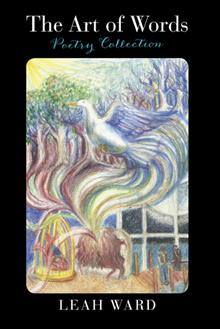
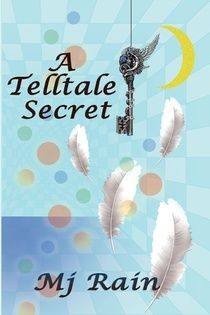
 RSS Feed
RSS Feed
